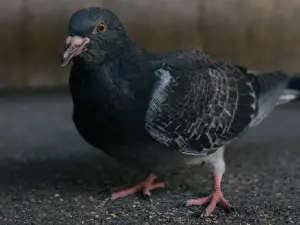
There are some overlaps between pigeon and human behaviour. We both shiver when it’s cold outside to regulate our body temperature, we both take baths to clean ourselves and we both really enjoy the occasional French fry. Other behaviours that we share including shaking. But do birds shake for the same reasons humans shake? This article explores the question of ‘why is my pigeon shaking’
There are a couple of reasons that explain why your pigeon is shaking, these can include stress, fear, cold or even excitement. In addition, since birds can’t talk they communicate through chirping or movement. Shaking is one way to communicate through movement.
Table of Contents
Why is my pigeon shaking?
If you think that your pigeon is shaking in an effort to communicate with you, or with another bird, then you’re right. Birds can’t talk so they use other methods to communicate, this includes shaking.
Pigeons shake for a number of reasons, these include: feeling cold, fear, excitement, stress or sickness.
As the owner of the bird, it is important to pay attention to your bird as the shaking may be its way of communicating discomfort or excitement, you need to know how to identify both.
Your pigeon may be trying to regulate its body temperature by shaking. If the animal is feeling cold, it will fluff up its feathers and if it’s overheating it will raise its feathers to aid air circulation around its body.
Also, pigeons are likely to feel stressed when moving to a new location, they will likely communicate their distress by shaking.
It is important to note that pigeons don’t only shake when something is wrong they also shake when they are very excited. You’ll have to look out for what’s making them excited and be sure the shaking is not from stress or the cold.
How to stop the pigeon from shaking?
If your pigeon is shaking/shivering because of cold, fear, stress or sickness there are ways to stop the shaking. Do this by;
- Raising the temperature of the room if the bird is feeling cold.
- Remove the bird from the cage, if it is shaking due to stress then letting it out of the cage will calm it down.
- Pigeons also shake when they’re afraid, it is important to note the source of their fear and try to reassure them that they are safe.
If you’ve tried your best to help your pigeon feel comfortable but the shaking persists, then you may need to contact a vet or an animal rehabilitator for assistance.
How do you tell if a pigeon has a disease?
It is important to know how to recognize sick birds so you can separate them in order to prevent the spread of disease to other birds. You can recognize sick pigeons either by appearance or by behaviour.
Healthy pigeons are always alert, clean and active. Signs of sick pigeons by appearance are;
- Dull or unfocused eyes
- Fluffed or rumpled feathers
- Dirty feathers, injuries, lesions or wounds
- Wet or crusty eye, mouth or nose discharge
By behaviour;
- Limping
- Troubled breathing
- Inability to feed properly
- Sitting too still when approached
- Falling asleep or dozing
How can I help my sick pigeon?
You can try the following steps to help your sick pigeon get back to normal:
- Sick pigeons need warmth (if they are cold), increase the temperature of the room if they are cold.
- Make food and water easy to access for the pigeon
- Reduce the pigeon’s stress levels so it can concentrate on its healing. You can reduce stress by removing other pigeons from the cage.
- Clean the cage and remove anything that might be the source of the sickness.
- If the pigeon is not drinking water or eating on its own, then you may need to contact a vet or an animal rehabilitator for assistance.
Conclusion
In conclusion, if your pigeon is shaking then this is likely because the bird is stressed, excited, cold or is feeling fear.
Increase the temperature of the room if it is cold and remove stressors if it is stressed.
You can tell if a pigeon has a disease if its feathers are ruffled, if its eyes are dull and unfocused, if it has wet crusty eyes, discharge coming from its mouth or nose, if it has trouble breathing, does not move when approached and if it is limping.
If you enjoyed this article then you may also be interested in other bird related articles. Here are some articles that you may be interested in: Why is my bird biting me all of a sudden?, When do pigeons moult?, How do pigeons reproduce?, Where do pigeons roost and why?

